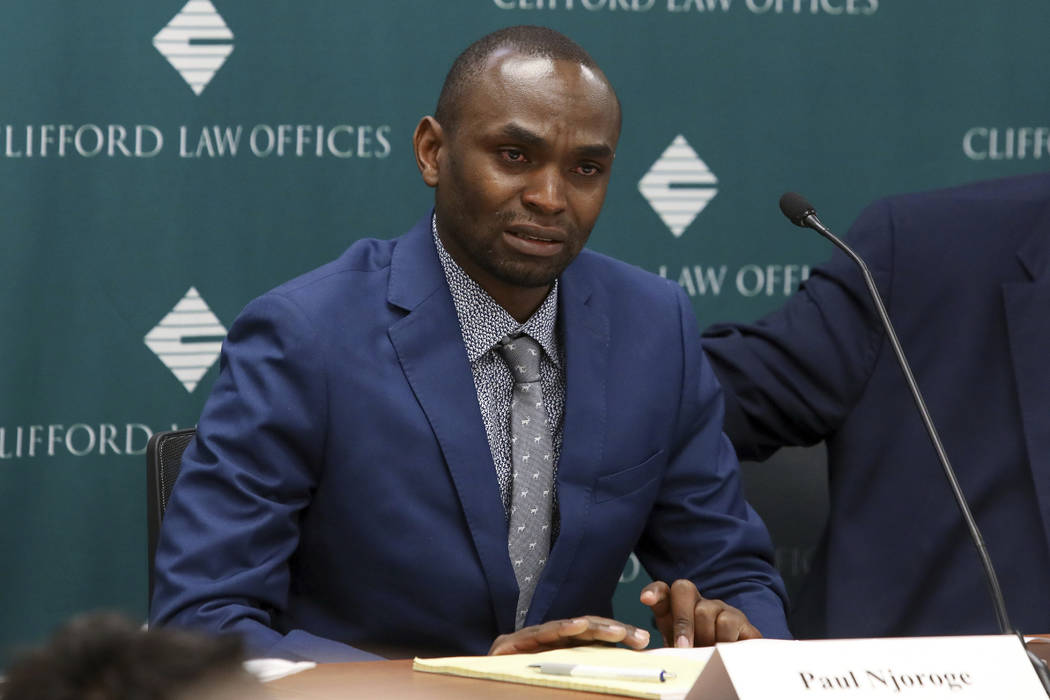Man haunted by family’s final moments on 737 Max, set to testify

When Paul Njoroge gets on an airplane, he becomes fixated on the first few minutes after takeoff.
“I have to look at my watch and see when I reach the 6-minute mark,” Njoroge says. That is the length of time that a Boeing 737 Max carrying his wife, three young children and mother-in-law was airborne before plunging back to Earth in a field in Ethiopia, killing everyone on board.
“I think about my family every minute of my life,” he says. “When I’m flying, I cannot even dare to sleep because I’m thinking about them. I dread going back into a plane.”
Still, Njoroge will fly to Washington to testify Wednesday before a congressional panel that is examining aviation safety after two deadly accidents involving Boeing’s best-selling plane. He will be accompanied by Michael Stumo, whose daughter, Samya, also died in the March 10 Ethiopian Airlines crash.
The Boeing Max has been grounded worldwide since shortly after that crash and it’s not clear when it will be certified to fly again.
In testimony prepared for the hearing, Njoroge and other families of the 346 people who died in the accidents will demand that regulators perform a new, top-to-bottom review of the plane. They’ll also call for airline pilots to get training in flight simulators — Boeing says computer-based lessons will suffice — and that Congress reform the Federal Aviation Administration, which certified the plane and declined to ground it after the first accident last October off the coast of Indonesia.
In a telephone interview with The Associated Press, Njoroge went further, saying Boeing should scrap the plane and company executives should resign and face criminal charges.
If Boeing and the FAA had done their jobs properly, he said, “these planes would have been grounded in November and today I would be enjoying summer with my family, I would be playing football with my son.”
Because the size and placement of the plane’s engines raised the risk of an aerodynamic stall, Boeing devised flight-control software called MCAS. Preliminary reports indicate that the software pushed the nose of the plane down in both crashes, and Boeing is working on changes to make MCAS more reliable and easier to control.
Boeing did not tell pilots about MCAS until after the Oct. 29 crash of a Lion Air Max. Njoroge believes the company hid the existence of the software to cover up what he considers an irredeemable flaw that MCAS was designed to offset — the plane’s tendency to pitch nose-up in some conditions.
Wants Boeing execs to resign
“I’d like to see (Boeing CEO) Dennis Muilenburg and the executives resign, because they caused the deaths of 346 people,” Njoroge said. “They should be held liable criminally for the deaths of my wife and my children and my mom-in-law and 152 others in the crash of Ethiopian Airlines flight 302 because that was preventable.”
Chicago-based Boeing said it lamented the impact that the crashes are having on families of those on board.
“These incidents and the lives lost will continue to weigh heavily on our hearts and on our minds for years to come,” the company said in a statement. “We are committed to working with the communities, customers and the aviation industry to help with the healing process.”
Njoroge, 35, was born in Kenya and now lives in Toronto, where he works as an investment professional. A Chicago aviation lawyer, Robert Clifford, sued Boeing on his behalf over the deaths of his wife, Carol, his son and daughters, 6-year-old Ryan, 4-year-old Kelli and 9-month-old Rubi, and his wife’s mother.
They were on their way to visit family in Kenya when the Nairobi-bound plane crashed.
Njoroge accused Boeing of trying to shift blame to foreign pilots in Indonesia and Ethiopia to avoid grounding the Max, which he called “utter prejudice.”
After the Lion Air crash, Boeing issued a bulletin to pilots reminding them about Boeing instructions for responding when the airplane automatically forces the nose down. After the Ethiopian crash, Muilenburg said the pilots did not completely follow the procedures. The preliminary report indicated the Ethiopian pilots tried the procedures nearly until the end but could not save the plane, and they were flying extremely fast.
Muilenburg has repeatedly apologized in public to families of the passengers. Njoroge said he has not received personal condolences.
“It would be very important if Boeing executives can meet with the family members in person and apologize to them,” he said. “That would help.”
Hasn’t returned to work
Njoroge has not returned to work since the accident and doesn’t know when — or if — he ever will.
“I’ve been trying to restructure my life, but I don’t know how to do it,” he said. “Every aspect of life today is a reminder that I’m alone now. It’s painful.”
Wednesday’s hearing will be the House aviation panel’s third on the Max. Other witnesses will include representatives from the National Transportation Safety Board and unions representing pilots, flight attendants, airline mechanics and safety inspectors.
The jet’s grounding is meanwhile having an impact on airlines around the world, with Europe’s busiest carrier, Ryanair, saying Tuesday it will cut flights and close some bases beginning this winter because of the delay to deliveries of the Boeing planes. It expects the Max jets to be back in service before the end of the year, though the date is uncertain.
American Airlines and United Airlines this month both said they will keep the Boeing 737 Max plane off their schedule until Nov. 3, leading to flight cancellations.
———
Gregory Katz in London contributed to this report.